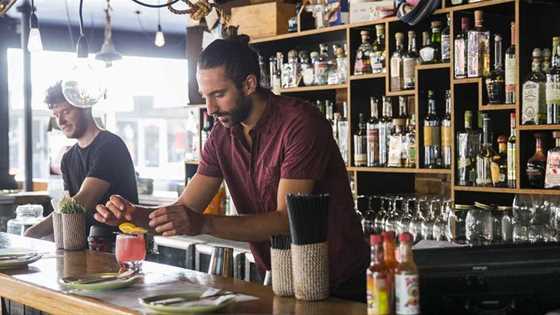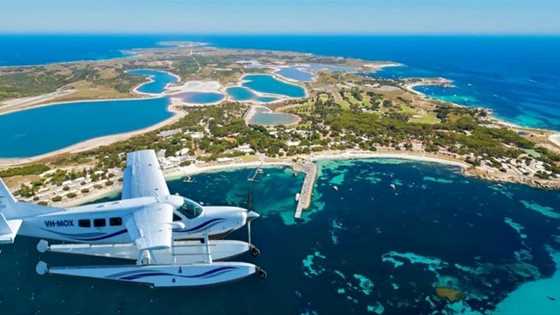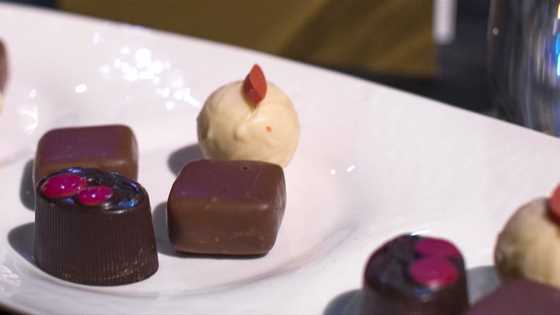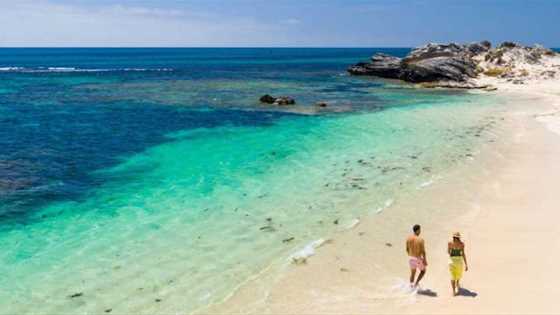West Aussie prawns have a taste all their own, but with more than half the prawns in our shops imported, chances are you’re missing out on it.
If you are wondering why the prawn you are eating doesn't taste like it used to, check that it's a wild-caught West Australian prawn.

MG Kailis Group's Alex Kailis.
It's a complaint commonly heard by MG Kailis Group director Alex Kailis, whose father, the late Michael Kailis, pioneered WA's Exmouth Gulf prawn fishery in the early 1960s.
"The explanation for the difference is simple," says Alex. "Twenty years ago you could only get WA prawns so that's all you ever tasted. Now there's a whole of range of imported and farmed product on sale and prawns don't all taste the same.
There's no question that Australians love their prawns – we eat 60,000+ tonnes of them each year – but more than 50 per cent are imported. The industry is rallying to put more effort into branding its produce by region, making it easier for consumers to identify them and to understand how fisheries are managed sustainably. "True choice can only come when you are aware of what you are buying," says Alex.
Seven companies operate in the state's largest fishery, in the World Heritage Listed area of Shark Bay. They have recently combined to launch a generic Shark Bay Wild branding campaign to powerfully link the region to their harvest. In addition to providing recipes for Shark Bay prawns in retailers, they have launched a website that allows consumers to gain a true appreciation of the fishery, how
it's managed and how they can find Shark Bay producers.

Seafresh Innaloo's Louis Lynch.
Seafresh Innaloo's Louis Lynch is a WA prawn aficionado – for him, every prawn has its culinary purpose, and every prawn in his fish market is West Australian. He puts the proposition simply. "Why wouldn't you buy prawns caught from the pristine waters of Shark Bay and Exmouth? The huge increase in the volume of imported farm prawns has kept the price of our wild prawns the same for the last
10 to 15 years, and there is just no comparison in quality, taste or texture."
The WA King prawn is his favourite and would probably get his crown as the quintessential Australian prawn. "It has the most delicate flavour," says Louis. "I love them best boiled, served with a lick of thousand-island dressing, salad, bread and glass of chardonnay.
"The Tiger prawn has a firmer texture, very much like crayfish. It's great in Japanese-style dishes like tempura and teppanyaki.
"The Banana prawns are smaller and sweet, an excellent prawn for Asian dishes; and then you have the Endeavour prawn which has a lot of lusty prawn flavour, and so is perfect for more European-style dishes, with creamy, garlic and wine sauces."
Admiration for the West Australian prawn is almost genetically ingrained in InContro's Peter Manifis, who is widely acknowledged as one of our nation's finest seafood chefs.
This reputation comes not just from the way he cooks, but also his vast seafood knowledge. Peter was born in Onslow; his father, Mick, was a professional fisherman and seafood processor. His two brothers followed their father and became prawn fishermen; Peter maintained the family focus on seafood but came to Perth to train as a chef with Alain Fabregues at Loose Box. When Peter talks prawns, he elevates the discussion to new level of discernment, detecting differences in prawns from different fisheries.
"The thing I love about our West Australian prawns is there is such diversity. I have stretched my love of the Pilbara, where I grew up, to include the Gascoyne region, particularly for the prawns they harvest.
"The Exmouth Gulf Tiger has richer colour, and stronger flavour – a heartier profile – reflecting the red earth of the area. I love to use them with the earthy flavours, with Mediterranean vegetables or mushrooms. The Shark Bay Tiger is crisper with a sharper taste, and its paler colour has a similarity to the whiter sand of the water there – beautiful in salads, fabulous with mango."

MG Kailis Group fishing manager Dr John Wakeford and senior skipper, Len Franklin.
While price and taste are crucial factors in determining purchase choice, increasingly sustainability is too. Research commissioned by the Fisheries Research and Development Corporation last year revealed that 58 per cent of those surveyed did not know if Australian fishing was sustainable, or thought it wasn't.
Each year the Department of Fisheries publishes its status report, which delivers
a scientific assessment on each fishery. Last year's report concluded that 97 per cent of our fisheries, which included all WA prawn fisheries, are sustainably managed.
Managing prawn fisheries is a fascinating process that is both complex and dynamic, but not one that's simply explained. The season open and closure dates vary each year, and are only set after extensive independent seabed surveys of stock by researchers at the Department of Fisheries. Many things influence the decision-making, including the current environmental conditions, and the strength and timing of recruitment and moon phases. The most important priority is to ensure a generous amount of breeding stock is left behind to create the new generation of prawns. The next consideration is that operators harvest when the prawns are at their prime, in size and condition, so the best possible quality prawn is sent to market.
Other measures over the 50-year history of the Exmouth Gulf and Shark Bay fisheries that have played a role in maintaining sustainability and protecting habitats include extensive permanent closures protecting nursery grounds, voluntary buy-outs that have reduced the number of vessels operating in the fisheries and, for the last 10 years, the mandatory use of Bycatch Reduction Devices (BRD) and Turtle Excluder Devices (TED), both of which allow smaller fish and turtles to escape trawling nets, resulting in a significant decrease in bycatch. Building on this long-established base, the Exmouth Gulf and Shark Bay fisheries have chosen to have their fisheries independently assessed against the Marine Stewardship Council's (MSC) environmental standard for sustainable fisheries, as a part of a State Government initiative that has provided $14.5m of funding to give WA's 47 commercial fisheries the opportunity to gain independent third-party MSC certification. If successful they will have the right to market their seafood using the MSC eco-label.
"Assessment against the MSC standard is not a process for the faint-hearted," says WA Fisheries deputy director general, Heather Brayford.
"Last year's status report on our fisheries was an excellent result and we are proud of the way we manage our fisheries. However the MSC standard is a very high bar, it provides an international benchmark that we want to meet. The reality is not all our fisheries will be ready in the short term. This does not mean they are not sustainable, it simply means that there are aspects that need to be improved to reach the high bar.
"Our vision is to have every fishery to the MSC standard in the next decade or two. The first region to go through pre-assessment was the Gascoyne, and we are delighted that the two major prawn fisheries, Exmouth Gulf and Shark Bay, have chosen the opportunity to go to full assessment and follow the lead of the Western Rock Lobster fishery. We are confident more will follow."
David Correia, manager of Correia Fishing Company, was born in Carnarvon where his father established successful banana plantations prior to the family becoming involved in prawning. He loves the region, and the decision to move to MSC accreditation is a logical one for what he argues is the world's most pristine fishery.
"We fish in a World Heritage area, which makes our prawns unique. We only fish a very small part of this amazing area, and the MSC will help us tell the story of our wild Shark Bay Prawns."
Alex Kailis also believes the MSC certification will be good for the industry. "The prawning industry has its critics, but I am very proud of how we sustainably harvest our prawns, and provide them to feed people – I think it's a noble cause, and I want people who eat our Exmouth wild prawns to feel good about it.
"The fact is every human endeavour touches the environment. Every time we eat something – a loaf of bread, anything – the production of it has touched the environment.
"People want to know what we do is sustainable. I know it is, but people are often suspicious of business and, rightly or wrongly, don't always believe government. They want an independent source to tell them a fishery is sustainable."
It's a sentiment shared by MG Kailis's long-term senior skipper, Len Franklin. A professional fisherman for 30 years, he loves his job. "I am very passionate. It's not a job, it's a way of life. I think I have spent more time at sea than I have on land. I make my living from the environment – why would I want to wreck it?
"I live in Exmouth and sometimes people challenge me, and accuse me of fishing the Ningaloo Reef. We don't go anywhere near reefs, not Ningaloo, not any reef. We fish on the sand, but I can't always make people understand.
"If we get the MSC accreditation I think finally people will listen to us, because it's a more believable entity."
The CEO of the Shark Bay Prawn Trawler Operators Association, Phil Bruce, says that the operators have always fished sustainably, and while you can't help but ask why the additional cost burden of external certification is necessary, the bottom line is that his members' livelihoods can be affected by perception.
"MSC is not a simple green-wash tick, it is a very rigorous scientific, independent process," he says. "And that comes at a cost."
What is the Marine Stewardship Council?
- The MSC's mission is to use its eco-label and fishery certification program to:
- Recognise and reward sustainable fishing
- Influence the choice people make when buying seafood
- Work with partners to transform the seafood market to a sustainable basis.
- The MSC sets a standard for sustainable fishing and seafood traceability. Third-party independent bodies assess the fisheries against the standard.
- The sustainable fishing standard has three principles:
- Sustainable fish stocks
- Minimising environmental impacts
- Effective management.
- The MSC was founded in 1997 in a partnership between WWF and fish processor Unilever, in response to the Newfoundland Grand Banks cod fishery collapse. It's now an independent, not-for-profit organisation based in London.
- Worldwide there are more than 300 wild-capture fisheries involved in the MSC program and 22,000 seafood products that bear the eco-label and can be traced back to sustainable fisheries.
- There are seven Australian fisheries that have MSC certification, they are: WA's Western Rock Lobster, Mackerel Icefish, HIMI Toothfish, Macquarie Island Toothfish, Northern Prawn Fishery, Spencer Gulf King Prawns, and Lakes and Coorong fisheries.
For more information, visit msc.org.








